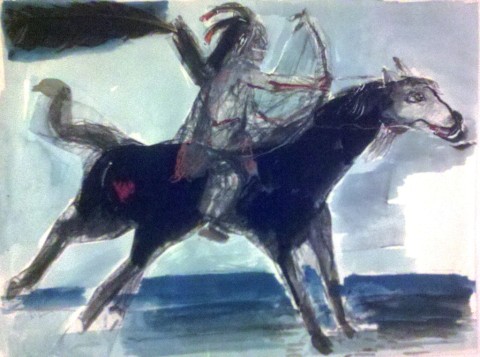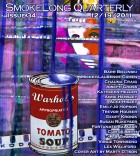My uncle was a high school track star. Around here that makes him a reservation legend. I go to the same high school as my uncle did, as my mother did, and all my cousins do, but I’m no track star and I don’t fool myself into thinking I’ll ever be one.
We still have a track team here, but it’s nothing to brag about. Basketball is our new tradition—not just for the school—but for the whole town. We see those athletes on the court and we pray that maybe someday one of them will make it out of here and show the world that we are here.
People still talk about my uncle. They say things like, “Remember Bobby Riley? Man he could run!” They talk about him like he is dead or not quiet like he is dead, but like the Bobby Riley who ran track and the Bobby Riley up the hill selling deer jerky and over-priced beer from his porch ain’t the same person. Maybe it’s easier that way, easier for everyone including my uncle. Better to pretend that the boy who ran track is gone.
The first time I remember seeing my uncle run the whole tribe was there, bleachers over-flowing. There were so many of us we formed a solid wall.
Then the race began and everyone had his or her eyes on my uncle or on the idea of my uncle, because he ran so fast he was just a blur. He ran so fast he crossed the finish line even before the sound of the starting shot stopped resonating in the air.
All that year we prayed; little prayers sent up to the sky when everyday tragedies occurred. When Nellie Crow went brain dead at the age of 17 after huffing gasoline, we prayed my uncle would make it to the Olympics. When Edgar Timmons got arrested in the next town over for robbing the mini mart—even though all they found on him was a candy bar—we prayed that my uncle would make it to the Olympics. When the salmon ran that year and there was less than the year before, with hungry stomachs we prayed that Bobby Riley would make it to the Olympics. And when the lumber company continued to log our land illegally and we were so angry we could hardly speak we sent up silent prayers that Bobby Riley would make it to the Olympics.
One late summer day Uncle took me to the city, about an hour’s drive from our reservation. When we got there, we went to the movies and got ice cream. He also bought me a pair of running shoes: dark blue with a yellow stripe. I wore my new running shoes on the way home. I curled my feet inside them and felt my legs tingling.
I asked my uncle, “How come you can run so fast?”
He was silent for a minute. I thought maybe he wasn’t going to answer.
Then he shrugged his shoulders and said, “Maybe if I run fast enough, run long enough maybe none of us will ever have to run again.”
I didn’t say anything after that. I didn’t really understand what he had told me.
As we got about halfway home we caught up to a car ahead of us swerving in and out of its lane. My Uncle nudged his head at the car. “Drunk.”
He pulled back a little, keeping a safe distance between us and the car until we could pass, but as we rounded a curve the car went off the side of the road. My uncle pulled over and told me to wait, then got out and ran off toward the car.
Later the police would come with looks and questions for my uncle that sounded more like accusations. Later the drunk man would say he thought the Indian was trying to rob him and he had a permit for his gun. Later the doctors would save my uncle’s life, but not his knee. Later, I would get home, take off my new running shoes, with some of my uncle’s blood still on them, put them back in the box and put the box onto shelf deep in my closet.
I never tried out for track. I haven’t given anyone hope I ever will, but sometimes late at night my legs wake me up. They talk to me. They tell me they want to run. They tell me they talk to the muscles of my ancestors and they are jealous. They tell me my ancestor’s muscles are warriors and they want to be warriors too. I tell them to be quiet. I roll over and try to go back to sleep, but they say they will never be quiet, never shut-up until I am running.
One night they will we wake me and I will listen to them. I will get out of bed, put on my shoes and walk outside. I will step off my porch and run. I will run so fast my feet will never touch the ground. I will run so fast the wind won’t be able to catch me. I will run so fast I’ll make the earth reverse, go back in time to before my uncle was shot, to before my tribe gave up hope, to before the salmon stopped running. I will run back into the arms of my ancestors, taking my whole tribe with me, and then maybe we will never have to run again.



 The core workshop of SmokeLong Fitness is all in writing, so you can take part from anywhere at anytime. We are excited about creating a supportive, consistent and structured environment for flash writers to work on their craft in a community. We are thrilled and proud to say that our workshop participants have won, placed, or been listed in every major flash competition. Community works.
The core workshop of SmokeLong Fitness is all in writing, so you can take part from anywhere at anytime. We are excited about creating a supportive, consistent and structured environment for flash writers to work on their craft in a community. We are thrilled and proud to say that our workshop participants have won, placed, or been listed in every major flash competition. Community works.